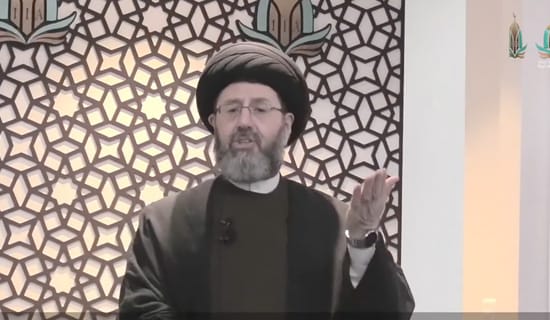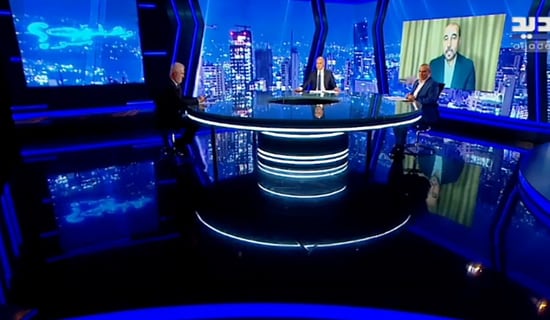
Former Kuwaiti Minister of Information Sami Abdullatif Al-Nesf said that throughout history, the Palestinian cause has suffered because of the extremists. "Lands are regained through peace, not through war," he said. He criticized the Mufti of Jerusalem Hajj Amin Al-Husseini for thwarting the partition plan, for urging the Palestinians to leave by blowing Deir Yassin out of proportion, and for his insistence on keeping the Palestinians in refugee camps. Al-Nesf, a pilot and former chairman and managing director of Kuwait Airways, said: "Unless we turn to the kind of reasonable thinking that we have lacked for a century, we will continue to accuse the voices of reason of being traitors, criminals, and collaborators, in order to walk in the path of extremism, which always ends in a catastrophe." He further said that "the issue of displacement is a common thing," and that "we chose to wage war and lost, so by logic, we should pay the price." The interview with Al-Nesf aired on the Kuwaiti Diwan Al-Mulla Internet TV on July 11.
Sami Abdullatif Al-Nesf: "Throughout history, nobody has harmed the Palestinian cause as much as the groups that compete in their extremism. Not many people know that in 1937, the royal British Peel Commission concluded that there should be two states – a solution the loss of which people are mourning today. The Peel Commission gave the Palestinians 90% of the land – 25,000 square kilometers – whereas the Jews were given a mini-state of 2,500 square kilometers, in areas that have been Jewish throughout history, in and around Tel Aviv.
[...]
"The loud and empty slogans by Mufti Amin Al-Husseini thwarted the two-state plan. Al-Husseini fled to Hitler, betting on the wrong horse. What I'm trying to show is that historically speaking, the Palestinian cause has lost time and again because of the extremists, not because of the moderates."
Interviewer: "Because of the extremist loudmouths..."
Sami Abdullatif Al-Nesf: "Israel has never benefited from the moderates, but from people who scream: 'The Deal of the Century? No to peace!' Another thing that I witnessed in person, unlike many others who talk about the Palestinian cause, is the changes on the ground. Today, when you go to Jerusalem and the West Bank, you see that they have changed entirely. The number of settlers has reached one million, and they will never leave. These are no longer prefabricated structures, like they were at the beginning. Now it is all concrete. No hill is left vacant. So unless we turn to the kind of reasonable thinking that we have lacked for a century, we will continue to accuse the voices of reason of being traitors, criminals, and collaborators, in order to walk in the path of extremism, which always ends in a catastrophe.
[...]
"[The Jews said] that any state is better than no state at all. They said that accepting [the plan] was better than rejecting it, in the hope that the other side would reject it. So the Jewish side accepted their 10%..."
Interviewer: "While the Arabs refused..."
Sami Abdullatif Al-Nesf: "Where did [Al-Husseini] go? He fled to Hitler. To this day, the Palestinian cause is paying the price of his pictures with Hitler.
[...]
"First, [Al-Husseini] rejected the 1948 Partition Plan, in which [the Palestinians] would have gained..."
Interviewer: "It included the West Bank and the entire..."
Sami Abdullatif Al-Nesf: "Secondly, he urged the Palestinians to leave, by blowing out of proportion what happened in Deir Yassin and elsewhere. For your information, massacres occurred on both sides. He blew it out of proportion because of his theory that the Palestinians should leave to make it easier for the Arab armies to move in. In addition, he thought that the Palestinians could be equipped with weapons abroad. Well, they left and never returned. Al-Husseini's greatest crime of all was his insistence on keeping the Palestinians in refugee camps. When the Armenians emigrated, they did not go to refugee camps. When the Kurds emigrated, they did not go to refugee camps.
[...]
"That man, with his extremism, harmed the Palestinian cause. He said: In order to avoid the loss of the Palestinian cause, let's keep the Palestinians in refugee camps in Lebanon, Jordan, and everywhere. They were placed in refugee camps, and to this day, they are paying the price. I say to our Palestinian brothers: Is radical talk all you care about? Do you really want to lose your cause?"
Interviewer: "Are slogans all they care about?"
Sami Abdullatif Al-Nesf: "Exactly. Slogans. Let me tell you what Mahmoud Abbas told me, and what I said to Khaled Mash'al in Damascus, and three times to Ismail Haniya, when we were having dinner in his Gaza home. Abbas said: 'The cause is about to be lost. Let's reach a solution with Israel, so we can at least keep what is left of the land.' Whenever the extremists cause war, more land is lost, and whenever peace is signed, the land is regained. The Sinai was not regained through war. It was lost twice in war, and was regained through peace. It was through peace that Jordan regained the land it lost in the 1967 war. Lands are regained through peace, not through war.
[...]
"[Hamas told Abbas that] they want a unity government. Fine, he said. The difference between us is that you do not recognize Israel. True, they said. We want to liberate Palestine from the river to the sea. He asked them: With what weapons would you do that? [Abbas] says: Since we were deported from the 1967 lands because of Arab extremism – in Syria, Egypt, and elsewhere – we have become completely dependent upon Israel. He says: If I gave ministerial positions to Hamas, where would a [Hamas] agriculture minister get water? The water comes from Israel. Let's say that you are the finance minister. The currency in Gaza and the West Bank is the shekel. If you want money, you get it from Israel. The electricity in Gaza and the West Bank also comes from Israel."
Interviewer: "The petrol comes from Israel..."
Sami Abdullatif Al-Nesf: "Food, water, everything...
[...]
"In 1917, just as there were extremists, there were also wise, reasonable people. One of them was [Lebanese politician] Shakib Arslan. He said: When I visited the [Jewish] settlements, I realized that they were like an advanced locomotive, which could pull us out of our ignorance, poverty, and so on. Those people are Europeans, who came to cultivate the land of the settlements, he said. There were Palestinians who said the same thing. Some Palestinians said: [The Jews] have been here since 1700-1800 and throughout history. The Israelites and the Land of Israel are mentioned in the Quran. Where was it? In Africa? No, it's the same land. Let's reach understandings, those people said. Extremists like Amin Al-Husseini, Arafat, Ahmad Shukeiri, and all the people who held the banner of extremism, have harmed the Palestinian cause and the cause of the Arabs.
[...]
"The Palestinians today, with their vocal extremism... It's not just the Palestinians, but us Arabs in general – we constitute the world's best kind of enemy: evil and vicious terrorists who are weak. Well, you can't have both. Hamas, with all its slogans, should show us the airplanes and tanks, which reflect its capability of doing what it says. It has none. Some people say: Oh for the days of Saladin... The European [Crusaders] did not come as settlers. They were driven by the lie that the Arabs were oppressing them. They just got in and got out. It was a business matter for them. Even Jerusalem – after Saladin liberated it, his brother, Al-Adil I, tried to give it back to the Crusaders, but they didn't want it. They said that they only wanted the coastal cities. So the entire issue of the settlements... The white people in South Africa are still there. They didn't leave.
[...]
"The issue of displacement is a common thing. We claimed that [1948] was the first time this ever happened, but it is not true, whether we like it or not. In addition, it is important to understand – and this has been true throughout history – that if you lose a war, you pay the price. We are the only ones who refuse to pay the price even though we lost the 1948 war. We lost the 1956 and 1967 wars, but refuse to pay the price. It doesn't work like that. We chose to wage war and lost, so by logic, we should pay the price. There is another thing that has been true throughout history. If I make a deal to buy this table from you for 10 dinars, that deal is valid only now. If you agree to the price of 10 dinars, the deal goes into effect now. But if not, I cannot return a year or two later, after it turns out the table is worth a fortune – let's say, 1,000 dinars – and say to you: Abu Ahmad, remember our deal from a year ago? The offer was for 10 dinars, but no agreement was signed. Had the Palestinians accepted one of those deals of the past, the ball would have been in the Israeli court now.
[...]
"Jerusalem was under Crusader occupation for 200 years, yet there was not a single fatwa prohibiting visiting the city."
Interviewer: "True."
Sami Abdullatif Al-Nesf: "Egypt was under occupation from 1882, but nobody said you couldn't visit Egypt or Al-Azhar. North Africa in its entirety was under occupation, but there was not a single fatwa prohibiting visits to the Great Mosque of Kairouan... Let me give you an even better example: Mecca. The Prophet Muhammad went on pilgrimage there when it was still ruled by the infidels. He did not say that he couldn't go there because it was occupied by the infidels. There were people who deceived us and told us not to visit [Palestine], and handed the West Bank, Jerusalem, and the Palestinians to [the Israelis]."













